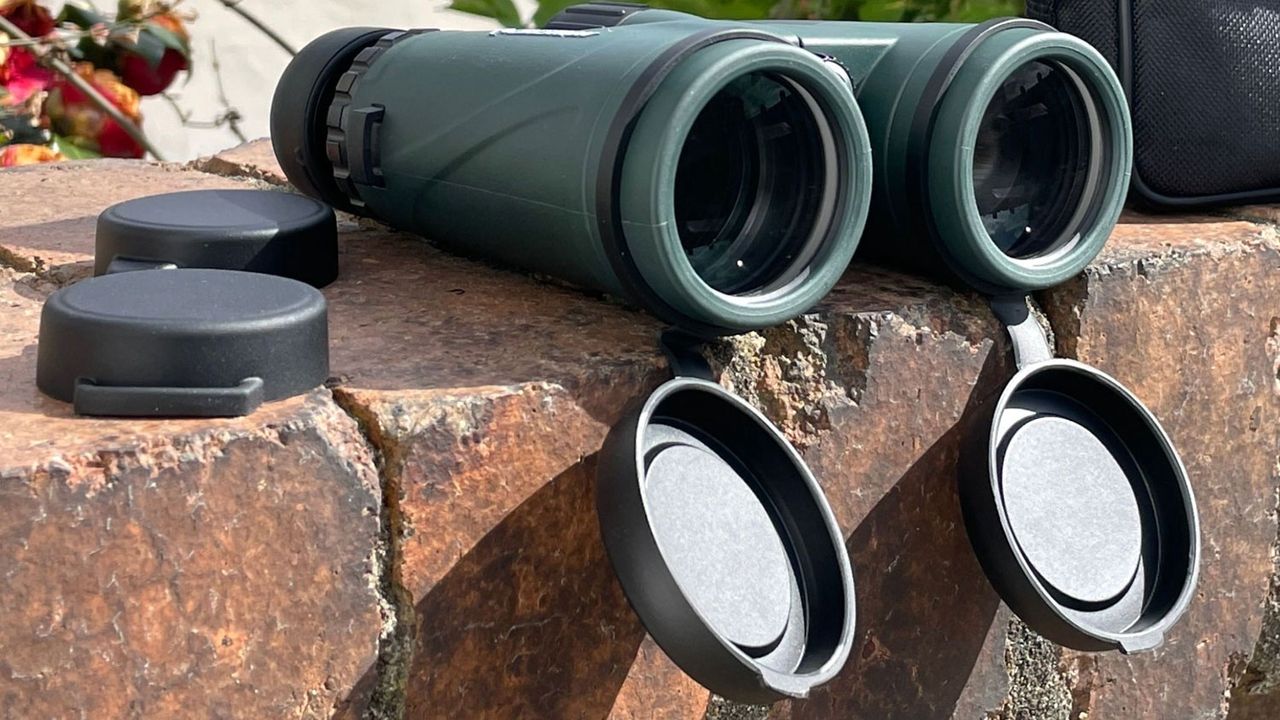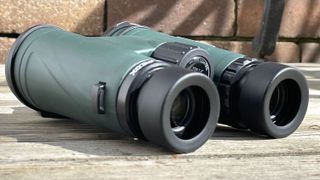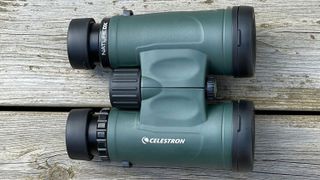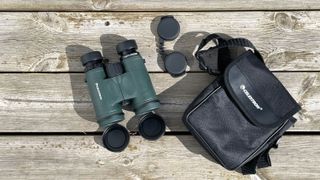Celestron Nature DX 8x42 binoculars review: a great value waterproof option for daytime use
The Celestron Nature DX 8x42 binoculars offer clear and bright images, a fast focus knob and a lightweight yet waterproof design.

A good value pair of mid-range, full-size binoculars for all-round use, the Celestron Nature 8x42 edge-out the competition with a combination of bright, detailed and colourful images, a fast focus and some refined design flourishes inside an unusually compact and lightweight package.
-
+
Detailed images in bright light
-
+
Excellent focus knob
-
+
Lens caps are attached
-
+
Waterproof build
-
-
Neck strap is poor
-
-
Blurry around edge of image
-
-
Not suited to stargazing
-
-
Lacks design niceties
Why you can trust T3

You could easily find a pair of binoculars more affordable than Celestron’s Nature 8x42, but this great value mid-range pair makes an argument not to. Extraordinarily compact given its 8x magnification and 42mm objective lenses, the Nature 8x42 are both waterproof and nitrogen-purged so won’t fog-up.
Add some excellent optics that give bright, clear images and the Nature 8x42 – while not perfect – will impress anyone after a pair of compact step-up binoculars that ooze a bit of quality where it counts. If you're after a pair of the best binoculars that won't cost you a fortune, these are a good bet; let's find out more.
- We've spotted the best binoculars for birdwatching
- Monoculars vs binoculars: which is better for what activity?
- Find the best night vision binoculars and goggles
Celestron Nature 8x42 binoculars review: price and release date
The Celestron Nature 8x42 binoculars have been available for several years and are priced at around UK£120/US$150/AUS$202.
Celestron Nature 8x42 binoculars review: design and features
Celestron Nature 8x42 binoculars review: Specs
Magnification: 8x
Objective diameter: 42mm
Field of view at 1000m: 129 metres
Closest focusing distance: 2 metres/6.5 feet
Eye relief: 17.5mm/0.69”
Weight: 629g/22.2 oz
Dimensions: 135x126x52mm/5.3”x4.9”x2”
The Nature 8x42 uses step-up BaK-4 roof prisms, with a hinge joining two separate barrels each of which have 42mm objective lenses. The Nature 8x42’s specifications should be considered the minimum requirements for a full-size pair of binoculars.
To prevent unwanted reflections inside the prisms causing ‘phase shift’ – something that can interfere with brightness, contrast and resolution – the Nature 8x42’s have phase-correction coatings. The optics are also ‘multi-coated’, which is something you’ll almost always see in any binoculars’ specification. It refers to anti-reflection coatings designed to allow as much light through as possible.
The Nature 8x42 are also notable for their generous eye relief. At 17.5 mm there’s more eye relief here than on most binoculars, which should make them relatively easy for wearers of spectacles to use. The eyecups twist-out in two positions, which they don’t easily slip from.
You’ll also find a small screw-ff cap between the barrels for mounting the Nature 8x42 on a tripod via an L-adaptor, though we’re not sure it’s necessary on such a compact and portable design.
Celestron’s Nature DX Series also includes 8x32, 10x32, 10x42, 10x56 and 12x56 variants, all of which also use BaK-4 roof prisms.

Celestron Nature 8x42 binoculars review: build and handling
The Nature 8x42 boasts a better build quality than most binoculars in its class. You’re not going to find a slip-resistant rubber armour covering on its barrels as you might find on high-end binoculars, but the green plastic faux-rubber in its place is perfectly usable. Kudos to the Nature 8x42’s designers for creating tiny indents on the hinge where fingers rest as well as slightly ridged oval hotspots on the underside of the barrels for thumbs. However, even the slightly textured barrel coverings give a nice impression of much more expensive binoculars.

The lens caps are also impressive, two; the objectives have drop-down caps that are hard to lose while the eyecups get a flexible dual cover that can be attached to the (sadly rather rudimentary) neck strap.
Although it’s not clear to what extent the Nature 8x42 are waterproof, we’d have no worries about taking them out on a hike or in the rain.
The Nature 8x42 comes in a rather nice pouch, which like the binoculars themselves have an unusual refined design in that there’s a small pocket provided. It proved useful during our review for storing a lens cloth and a small notebook recording observations. It’s just a shame that its shoulder strap is of really basic quality.
Celestron Nature 8x42 binoculars review: performance
In use the Nature 8x42 proved easy to use and offered impressive images across a range of activities. Used at a rugby match we were able to get them into a jacket pocket without much of a problem. Here the Nature 8x42’s unusually compact size for their specification proved decisive, though just as impressive were the sharp images of players from afar. Even when the light faded the Nature 8x42 continued to offer reasonably bright images. Ditto when we used the Nature 8x42 for bird-watching in the garden; targets are always bright, sharp and colourful with only very mild blurring around the edges of the image. What we liked about the Nature 8x42 for bird-watching was the ability to very quickly fine-tune the focus.

It’s fair to say that there are much better binoculars out there for stargazing and astronomy, but the Nature 8x42 does a decent job at night. We were able to get a good view of the Pleiades star cluster while there was no purple fringing around a bright Moon.
The diopter dial on the right-hand eyecup (which is critical to calibrating a pair of binoculars to your vision) proved both a little stiff and a little basic. Its stiffness held it in place for a long period, which was just as well because the Nature 8x42 lacks both a scale and a locking mechanism. If you’re going to be the sole user of the Nature 8x42 then that’s a non-issue.
Celestron Nature 8x42 binoculars review: alternatives to consider
Similar to the Celestron Nature 8x42 are the Nikon Prostaff 3s binoculars, which also come in the 8x42 flavour. They're also roof prism binoculars with a waterproof and lightweight design. A step-up choice would be the Olympus 10x42 PRO (opens in new tab), which can focus on objects just 1.5 away and has a coating that reduces flares and ghosting.
If you can splash even more cash then head straight for the Canon 10x42L IS WP binoculars, which boast ultra-low dispersion (UD) lens elements for edge-to-edge sharpness and unique image stabilisation that cleverley cancels-out any shakiness in your arms.
Celestron Nature 8x42 binoculars review: verdict

Ideal for beginners looking for optically impressive and hard-wearing binoculars for all-round use, the Nature 8x42 are notably lighter and more compact than similarly-priced 8x42 rivals. Ideal for birdwatching, sporting events, safari and more, they boast an unusually refined design at this price-point and excel in bright light. Detailed and colourful images are the order of the day with the Nature 8x42 also capable of offering some decent images of the night sky.
With lens caps you can’t lose and a tough, waterproof design these lightweight bins punch above their weight and are perfect for tossing in a backpack or taking on safari.
Sign up to the T3 newsletter for smarter living straight to your inbox
Get all the latest news, reviews, deals and buying guides on gorgeous tech, home and active products from the T3 experts
Jamie is a freelance journalist, copywriter and author with 20 years' experience. He's written journalism for over 50 publications and websites and, when he's not writing, spending most of his time travelling – putting the latest travel tech through its paces.
-
 Nicole Kidman's renaissance continues in new Prime Video thriller
Nicole Kidman's renaissance continues in new Prime Video thrillerHolland looks like it might devolve into terror
By Max Freeman-Mills Published
-
 Amazon Prime's new no.1 is Rotten Tomatoes' worst sci-fi movie of 2024
Amazon Prime's new no.1 is Rotten Tomatoes' worst sci-fi movie of 2024Borderlands is Amazon's most watched – but, yikes, the reviews are bad!
By Mike Lowe Published
-
 MWC 2025 live: All the news from the world's greatest mobile show
MWC 2025 live: All the news from the world's greatest mobile showMobile World Congress kicks off for its 2025 edition – and T3 is on the ground to bring you the latest and greatest news from the show
By Mike Lowe Published